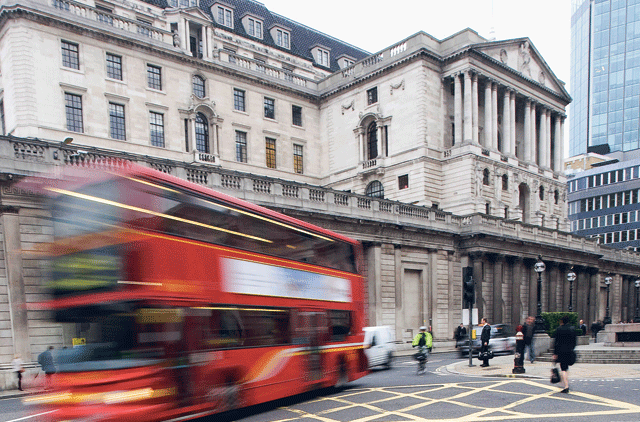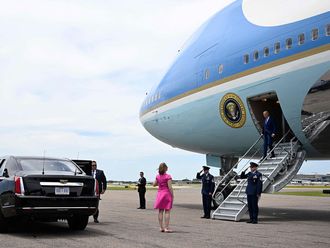
London : The Bank of England kept its bond-stimulus programme in place and left its benchmark interest rate at a record low to aid the economy as Prime Minister David Cameron prepares the biggest budget cuts since at least the early 1980s.
The Monetary Policy Committee, led by Governor Mervyn King, left the target for its bond holdings unchanged at £200 billion (Dh1.075 trillion), as predicted by all 35 economists in a Bloomberg News survey. The bank also kept the benchmark interest rate at 0.5 per cent.
Bank of England officials are nursing an economic recovery that weakened in the past quarter as they stave off the threat of contagion from the euro region's sovereign debt crisis and await Cameron's emergency budget on June 22. The bank is keeping up stimulus even as inflation exceeds the government's 3 per cent upper limit.
"A move by the Bank of England is unlikely in the near term," Nick Kounis, chief European economist at Fortis Bank Nederland NV in Amsterdam and a former UK Treasury official, said in a telephone interview. "There are risks related to tighter fiscal policy and the eurozone. There is some worry about inflation, but they're probably judging there are enough headwinds to offset that so they can wait and see."
The pound was little changed trading up 0.3 per cent yesterday at $1.4608 at 12:29 p.m. in London. The currency has dropped 10 per cent against the dollar this year. The yield on the benchmark two-year UK government bond was unchanged at 0.81 per cent.
All 61 economists in a Bloomberg News survey predicted no change in the Bank of England's benchmark interest rate today. The European Central Bank will keep also its key rate unchanged at 1 per cent, a Bloomberg survey of 59 economists shows. That decision was due at 1.45pm yesterday in Frankfurt and President Jean-Claude Trichet will hold a press conference 45 minutes later.
Some Group of 20 central banks are delaying withdrawal of emergency stimulus after Greece's debt crisis provoked a round of austerity measures across Europe, threatening to hinder the global recovery.
Trichet has reversed his exit strategy and last month joined the Bank of England in buying government bonds as he tries to shore up the euro.
Federal Reserve officials including Charles Evans and Dennis Lockhart have signalled that market stress will delay an increase in US rates.
Bank of England's decision yesterday is the first since the creation of Britain's coalition government on May 11. Central bank officials have yet to see the full details of public spending cuts due to be announced by Chancellor of the Exchequer George Osborne to tackle the record budget deficit.
Policy makers, who reached their target for bond purchases in January and decided in February not to extend purchases, faced evidence this month that price pressures have increased because of higher energy costs and the pound's weakness. Consumer prices rose an annual 3.7 per cent in April, the most since 2008. Officials have said the inflation jump is temporary and won't last because of the aftermath of the recession.
The Bank of England should consider raising interest rates and scaling back its bond holdings before the end of the year as consumer price pressures mount, the Organisation for Economic Cooperation and Development said.
"The Bank of England's next move will be a rate increase and it'll be in the first quarter of next year," Brian Hilliard, a London-based economist at Societe Generale and former central bank official, said. Still, "it's only going to be a very gradual economic recovery".
Cautious
New Look Group, a UK budget clothing retailer, said June 2 that it is "cautious" about 2010 because the economy "remains vulnerable" to higher taxes and unemployment.
The risk for the Bank of England is that the spending cuts, which will be announced by Osborne in two weeks, push the economy back into recession. Gross domestic product rose 0.3 per cent in the first quarter, compared with 0.4 per cent in the previous three months. Cameron said June 7 that the effects of budget cuts "will stay with us for years, perhaps decades".
The UK will have a budget deficit worth 12 per cent of output this year, compared with Greece's shortfall of 9.3 per cent, the European Commission forecasts.
"I'm in favour of avoiding any sort of tightening of policy" this year, Neil Mackinnon, a economist at VTB Capital in London and a former UK Treasury official, said before the decision. "There is also a case for extending quantitative easing. Money supply growth and credit growth remain quite subdued. Without any growth there, it's very difficult to see how you're going to get growth" in the economy.
M4, the broadest measure of money supply, rose 3.3 per cent in April from a year earlier, the least since September 1999. Mortgage approvals totalled 49,871 in the same month, less than half the peak during the housing boom in 2007.
The meeting was the first time since September 2006 that the rate-setting panel has met without its full complement of nine members, as the UK Treasury searches for a replacement for Kate Barker.
Cost cutting measure
Britain could save more than £100 million (Dh537.82 million) over the next three years by cutting unnecessary domestic flights by government officials, a UK environmental group said yesterday.
A report by WWF-UK found that 90 per cent of all flights are taken within the UK and that cutting out this type of domestic travel could chop 600,000 trips and reduce carbon emissions by more than 59,000 tonnes. WWK-UK said these flights should be targeted among austerity measures and replaced by low-carbon rail transport or video-conferencing. Britain is bracing for deep cuts in an emergency budget on June 22, which Prime Minister David Cameron said are necessary to prevent the country from descending into a Greek-style sovereign debt crisis.
"It's shocking that nine out of 10 flights by government officials are to destinations within the UK," said David Norman, WWF-UK's director of campaigns, in a statement.
— Reuters












